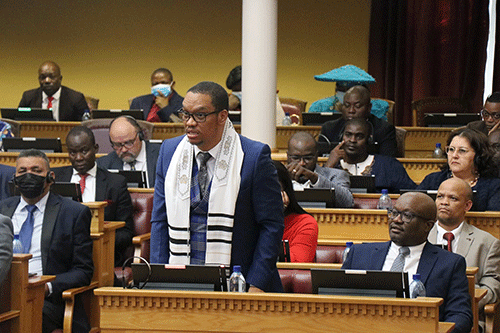WALVIS BAY – Landless People’s Movement leader Bernardus Swartbooi says he does not know what to expect from the Pan-African Parliament (PAP).
Swartbooi was nominated earlier to represent Namibia at PAP, along with deputy speaker of the National Assembly Loide Kasingo and PDM president McHenry Venaani.
The PAP was set up to ensure the full participation of African people in the economic development and integration of the continent.
According to Swartbooi, the footprint of PAP is very light in terms of what it needs to do for the people of the African continent as a combined body.
Swartbooi shared his sentiments with some of his party members last week, saying that PAP was structured along the lines of the European system.
“However, when you look at the European system, it has an impact. It strives for change and legislative formation and sets a very clear direction for where they want to take Europe. We will have to see how PAP functions,” Swartbooi explained.
He added the fact that PAP could last year not resolve a simple issue, such as the election process, speaks volumes.
“That institution has not been visibly strong and profound. What is its footprint in the quest of promoting better livelihoods for the citizens of this continent? Those are questions we are beginning to ask as we read those documents,” Swartbooi said.
However, he hopes PAP will contribute to democracy and transparency and help the continent in solving critical issues.
The LPM leader, nevertheless, said he is looking forward to joining PAP, despite his reservations.
He is also hoping the institution can create model laws that will help member states to implement workable laws.
‘Weaker feeding parliaments’
Meanwhile, political commentator Ndumba Kamwanyah concurred with Swartbooi that Africa has not seen a tangible impact of PAP since it was established. This, according to Kamwanyah, is because of weakening feeding parliaments from member states, simply because African countries do not elect members for competence and impact but more for political allegiance.
“It is an unfortunate situation that we end up with that due to political driven appointments. However, we are optimistic that younger parliamentarians, such as Swartbooi, are joining PAP, as it signals change for the continent,” he said.
Also commenting on the issue, political analyst Rui Tyitende says PAP has been plagued by internal conflicts, malfeasance and disunity from members who are tasked with the sole purpose of advancing the social, economic and cultural interests of the African people.
“The African continent is riddled with violent conflicts, a perpetual state of coup d’états, hunger, poverty, unremitting unemployment and disease,” he said.
“The only reason why it is still in existence is because of the collective symbolism and unity that African states attached to the suffering they endured at the hands of colonial forces. What unites us beyond a common struggle for independence? If we are divided within our respective states – not to mention separatists’ ambitions across the continent – then why pursue this elusive political agenda? The idea of a united continent is symbolically important, but it does not speak to the situation on the ground.”
Another political analyst Romeo Goseb says PAP must endorse a guiding policy on leadership rotation amongst its ranks, as it has largely been led by representatives from the Arab nations and the West African states.
“Regionalism and leadership entitlement syndrome must be fought tooth and nail. Its impact on Africa is not visible nor do they present any evidence thereto. PAP needs a serious inner introspection to gauge in which spheres they are lacking and to put corrective measures in place,” he said.
“Economic emancipation must be driven by Africans with the know-how. We do have successful game changers in Africa but the political systems in most African countries are of such that there’s a total lack of conducive circumstances that can attract investment that can propel Africa towards growth.”
– edeklerk@nepc.com.na


